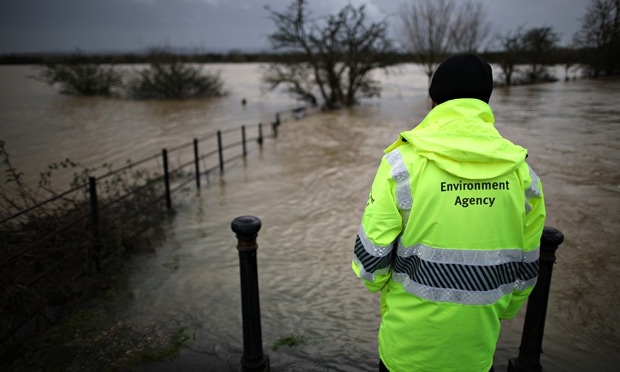New cuts to councils’ flood budgets in England will leave them under-resourced and ill-prepared, say community groups

Labour and community groups say the government is going backwards on flood risk management after ministers made cuts of a third to this year’s local authority flood budgets. (Photo by Peter Macdiarmid/Getty Images) Photograph: Peter Macdiarmid/Getty Images
Damian Carrington
Funding for councils to deal with flooding has been slashed by a third by ministers, prompting community groups and Labour to say the government is going backwards on managing flood risk.Last winter, the wettest on record, saw devastating flooding across the country and forced David Cameron to reverse earlier cuts to flood defence budgets.
The revelation of the new cuts to council flood budgets in England comes as the Met Office’s three-month outlook indicates this winter is likely to be wetter than average. The government’s own report concluded in 2012 that flood risk is rising due to climate change.
County councils and unitary authorities have legal responsibilities as Lead Local Flood Authorities (LLFAs) such as playing “a lead role in emergency planning and recovery after a flood event”. The responsibilities also include creating flood risk management strategies, investigating the causes of significant floods and raising local awareness, according to the Local Government Association. But the £10m funding now set for 2015-16 is £5m less than in the previous year.
“This is dire,” said Paul Cobbing, chief executive of the National Flood Forum, which represents community flood action groups. “LLFAs are at the heart of flood risk management. They are already under-resourced and this puts flood risk management backwards at the very point when a step change forwards is needed.”
Mary Dhonau, a national flood campaigner, said: “Cameron stood there saying ‘lessons will be learned’ and ‘money was no object’ and then ministers go and make these sweeping cuts. He has clearly pressed the snooze button yet again and gone back to sleep. LLFAs are very much on the frontline.” She said the cuts would mean job losses among council flood staff.
A spokeswoman for the Department of environment, food and rural affairs (Defra) said: “The funding to LLFAs was always going to be initially higher in order to allow them to gather information on local flood risk and understand how to manage the risk. The planned reduction does not affect emergency planning and recovery funding.”
Advertisement
She added: “We absolutely recognise the importance of tackling flooding which is why we are investing £3.2bn in flood management and defences. This is more than ever before.”
However, a National Audit Office (NAO) report published earlier in November concluded flood spending had actually fallen by 10% under the coalition government, increasing the risk of homes being flooded and leaving half the nation’s flood defences with “minimal” maintenance.
Furthermore, the NAO found that despite the higher initial funding, just 14% of LLFAs had managed to publish their flood risk strategies since being required to do so in 2011. “Their workload is absolutely enormous,” said Dhonau.
Dan Rogerson, the Lib Dem flooding minister, said on 4 November: “With winter on its way, we need local authorities to play their part in this and ensure they are fully prepared to respond and give clear advice to residents and businesses on how to plan for emergencies.”
Maria Eagle, Labour’s shadow environment secretary, said: “The public will be looking to the government for assurances that we are better prepared for flooding this winter than we were last year. The news [of LLFA budget cuts] will do little to provide such assurances.”
She said: “There is no doubt that flood risk management has gone backwards under this government. David Cameron abandoned the last Labour government’s robust plans for reducing flood risk, slashed the budgets, crossed his fingers and hoped for the best.” The nation’s preparedness for flooding is being debated in parliament on Wednesday.
Climate change is increasing flood risk in Britain by driving more extreme weather events. The government’s official advisors, the Committee on Climate Change, calculate there is a £500m hole in the government budget for flood risk management, with damages of £3bn likely to be incurred in the future as a result.

